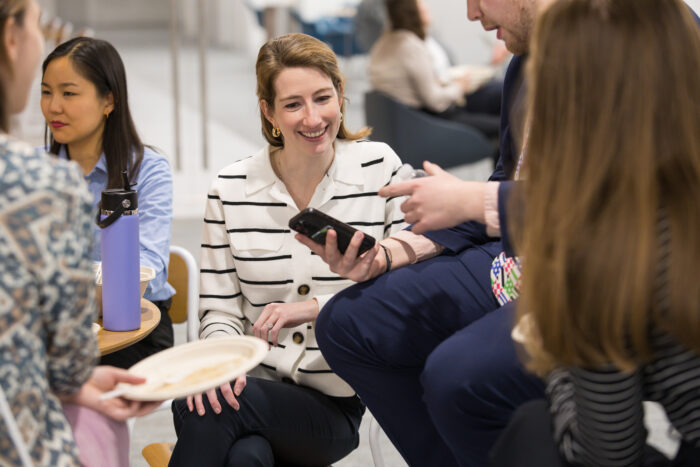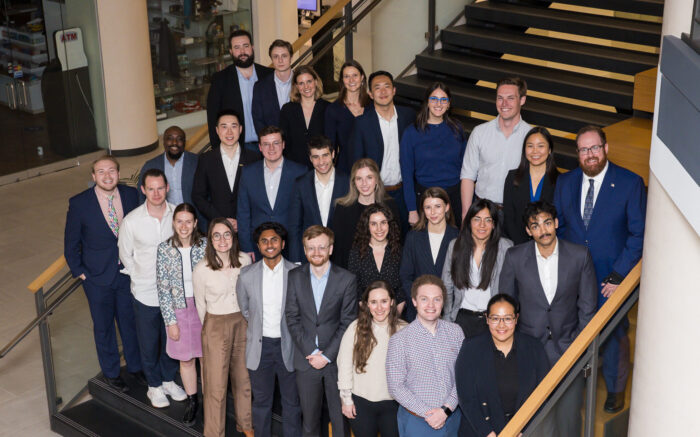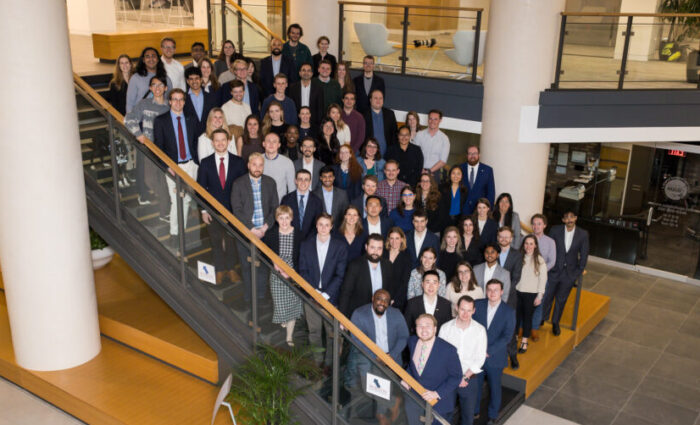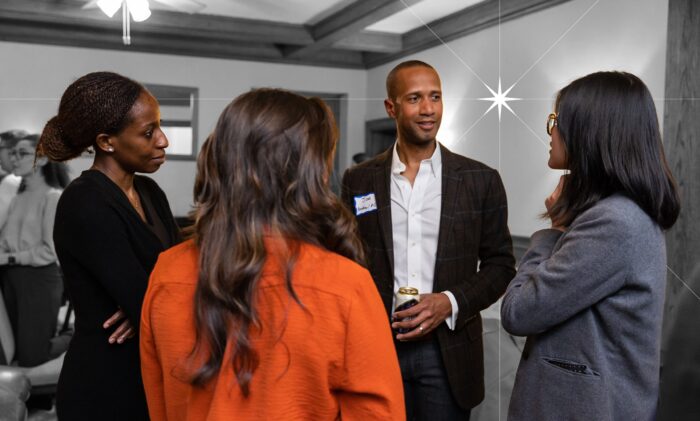Fellow Q&A: Willy Chertman
This is part of our fellow Q&A series to give prospective applicants and other interested audiences a glimpse at what it’s like to be a Horizon Fellow.

Before becoming a Horizon Fellow, you received your MD from the University of Miami. What inspired you to become a doctor, and what was your experience like in medical school?
I’m not sure that I have the most inspiring story about going to medical school! I was good at biology as an undergraduate. Much of my family is in medicine, and the exposure I had from shadowing doctors in college was pretty positive, so I decided I want to be a doctor. Overall, I enjoyed medical school itself a lot. I think I was a lot less stressed than most people — maybe that was my particular program or maybe that was my personality. I had a lot of time to read about stuff on my own and think about what residency and fellowships I wanted to do. When COVID-19 hit in 2020, I had a few months in which med school was mostly virtual, where I was supposed to be doing in person rotations at the hospital, but couldn’t go in.
Those were a few months where I had a lot more free time than I was accustomed to. I was reading a lot of books about the FDA and our public health system, thinking a lot about COVID-19 and our response to it. I started thinking about how I could make more of a positive impact on the world. It basically got me thinking that our public health response wasn’t great, and I thought maybe I would have some interesting perspectives to bring on this, both as a doctor and as someone who’s more conservative, I think, than most people that are interested in pandemics and biosecurity. I decided to think more about how to get into policy. From there, I reached out to a bunch of people who were working on policy and basically cold emailed my way into helping out with projects on a volunteer basis.
Do you think coming from a medical background gives you a perspective that other people don’t have in your policy work?
Medicine is effectively like a very broad but somewhat shallow biology graduate degree. You usually don’t get much wet lab experience, though I did get a bit of experience from doing research on my own, and I also got a solid grounding in a pretty wide swath of biology. I’ve found that to be pretty helpful. I’ve also gotten a shallow understanding of other topics, like epidemiology, which has been relevant for working in biosecurity and health policy. Then you also get some nice real world exposure to what health systems actually do.
A practical example is one initiative that happened during COVID-19, which involved trying to get real-time feedback on how many patients were in the hospital, how much hospital capacity was actually available, and how many of those patients were in the ICU. The Center for Medicare & Medicaid Services started tying reimbursement rates to hospitals reporting all this data.
When you think about it, it’s actually wild that it took a pandemic to get a real-time sense of hospital capacity and hospital burden. The reason is that to get all the data, you need to have incentives for people in the healthcare system to report the data. So, doctors, nurses, social workers, and hospital administrators, would write down, for instance, that they have ten ICU beds on a given day. Eight of them are with COVID-19 patients, two of them are free. The people who’d be reporting that information up the chain, they’re incentivized to do so because of the payment that hospitals needed during COVID-19. It was an interesting example of what you would need to do to have real-time data monitoring. When you’re actually working as a doctor, I think you do get a sense of what it’s like on the ground: there’s so much paperwork on your plate, there’s a lot of patient care duties that you have, and so you understand how a request for more paperwork feeds in.
That’s fascinating. So you then went on, as a doctor, to do policy research at both the Institute for Progress and the Manhattan Institute. Can you say more about that transition?
During my fourth year of med school, I was very curious about why COVID-19 human challenge trials, in which consenting volunteers would be deliberately exposed to SARS-CoV-2 to test vaccine efficacy, had not happened. I knew that there had been some advocacy around them — for instance, there had been a letter signed by multiple senators on the issue, writing to the relevant agencies, asking, why isn’t this happening?
I was curious about it, and I started cold emailing people who I thought might know about this to learn more. And then I had this pretty harebrained scheme to apply to Emergent Ventures to get funding to do a bunch of Freedom of Information Act requests to find out why this didn’t happen. And in the process of researching for this grant, which never got funded, I ended up speaking with some people at 1Day Sooner. They suggested I talk to Josh Morrison, 1Day Sooner’s president, because he might be interested.
Josh told me they might do the project one day, but that it wasn’t a priority. I ended up volunteering to help him with various tasks that 1Day Sooner was working on. He let me know about a collaboration between the Institute for Progress and Federation of American Scientists who were running something called the Day One Project, which was learning how to write a policy memo on some topic of your choice. So I wrote a policy memo with many people’s guidance on using advanced market commitments to incentivize new vaccines and therapeutics, and made a lot of connections in the process.
After policy research, you applied for the Horizon Fellowship, and now work in Senator Todd Young’s office. What led you to apply?
I heard about the Horizon Fellowship from people who worked in policy who knew that I was in medical residency but open to maybe working in DC. A big component for me in my decision was that I enjoy writing and I enjoy trying to convince people of things, and I think those are maybe more useful for policy work than they are for medical residency directly. It also just felt like a good time to enter the policy world.
You’re now working at a Senate office. What has that been like in comparison to the policy research that you were doing before?
I think it drives home that there’s a lot of non-reported stuff happening in the background that you just won’t have visibility into unless you’re very well-connected already or you go work on the Hill. Working in a think tank is good to develop expertise. It’s good to sort of brand yourself as knowing a lot about a relatively narrow subject. But if you actually want to figure out why a specific piece of legislation is or isn’t changing, unless you already have a lot of connections, I think there’s no substitute for just working on the Hill and learning more about issues, because in general, even the best reported STAT News article or New York Times article about some healthcare policy issue will probably omit a lot of things that you would know if you were in the rooms when these things were happening. I think it’s not like a sinister thing — it’s just that nobody wants to read a detailed article that’s 10,000 words.
Senator Young, whose office I work in, is on the National Security Commission on Emerging Biotechnology. This is a temporary commission charged by Congress to investigate relatively technical issues related to biotechnology and biosecurity in a more thoughtful, slow way. There was previously an AI commission along these lines from a few years ago, and there has also been a fiscal commission and a reforming Congress commission. This is one of the tools Congress has to think about issues on a longer term basis. It’s a bipartisan commission with two senators and two representatives. It also has a bunch of subject matter experts who are thinking about biotechnology from the lens of US-China competition and from the lens of preventing the misuse of technology and developing our workforce. My role in the office has been to do the work associated with that commission under the supervision of the health policy advisor and the national security advisor, who both have a lot of experience working on the Hill. I serve mostly as a subject matter expert on biotech and medicine, but they know much more about the Hill and how it works than me, so I learn a lot from them.
I also do some stuff outside of that on the intersection of AI and biotechnology, and then some work on long COVID as well.
What has been a highlight of the Horizon fellowship so far?
I think there are two highlights. One is just seeing what policy work is actually like, which as I’ve mentioned is very difficult to understand from the outside. And number two is Horizon has a super high-quality alumni network. That’s been, I think, a fast track into learning more about this space. It’s not exactly mentorship, it’s not that direct, but it’s more like: I could see myself in these people’s shoes in a few years. That’s been very helpful from a career modeling perspective.
What has been a challenge in your current work?
I think whenever you’re a fellow, you sort of parachute in with subject matter knowledge to Congress, but you lack understanding of how legislation actually happens. There’s a lot of very niche knowledge about timelines for bills and appropriations, relevant stakeholders and interest groups, and so on. What are the things that have been tried in this space that people view as warning signs or things to follow? So there’s just like a ton of knowledge that you would develop in a normal congressional career course by interning and then working as a staff assistant and then as a legislative assistant and then higher up in the food chain. You don’t get much of that training as a fellow, which means you have to rely on other people who know a lot more. And so that just ends up limiting you until you learn more.
How have you stayed in touch with your cohort of Horizon fellows during your fellowship?
I’ve stayed in touch in a mix of ways! I run into people at happy hours and events that people throw. I’ve done some dinners with people. I’m actually going to do movies with some other Horizon fellows tonight. So it’s a mix of both seeing people at social events and then running into them on the Hill.
What advice do you have for anyone applying to the Horizon fellowship?
I think it’s important to be very honest with yourself and to get good advice from other people about what they think of as your strengths, and then try to find the best fit in the role you want to do in the policy world.
In general, I think you have to be good at socializing with people and presenting your ideas, at a range of tasks like sending good follow-up emails, and so on. There’s a whole cluster of skills which are sort of different for working on the Hill versus working in a think tank versus working in the executive branch, but they all rely on some degree of social skills, broadly framed, and knowing if you’re up for that is important.
Another good way to do this is just to talk to people who work in policy. Are you excited about doing similar work to them? Do they think that you can fit in somewhere? If yes, then it’s a great idea to pursue the role.



